Featuring 100 Women: Champion Chronicles
Honoring Eight of Iowa’s Outstanding Women’s Amateur Champions
In the heartland of America, amidst the sprawling fields and quaint towns of Iowa, a tradition of excellence in amateur golf has long been woven into the fabric of the state’s sporting history. Among the storied tales of fairways conquered and greens mastered, the triumphs of Iowa’s women stand out as beacons of skill, determination, and poise. Across the decades, these champions have left an indelible mark on the landscape of the game, showcasing not only their prowess on the course but also the enduring spirit of competition that defines the Iowa golfing community. As we reflect on the illustrious history of the Iowa Women’s Amateur Championship, we celebrate eight remarkable individuals whose names are etched in the archives of greatness.
In the summer of 1923, amidst the rolling fairways at Hyperion Field Club, Ruth Harwood emerged as a shining star in the Iowa Women’s Amateur Championship. Harwood navigated the challenging terrain with precision and poise, captivating spectators with her skillful play. Despite the intimidating competition, she showcased maturity well beyond her years, surging ahead to claim the coveted title.
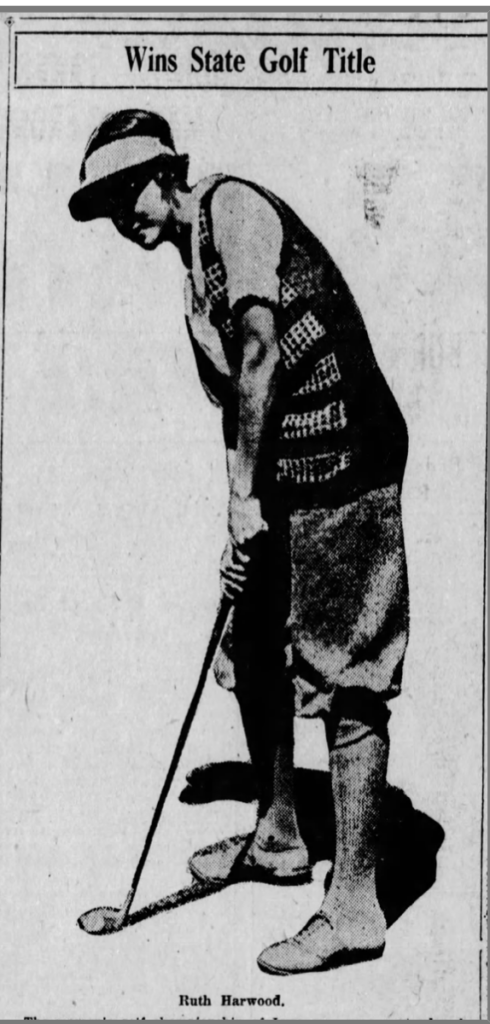
Harwood’s triumph at the 1923 Iowa Women’s Amateur was not merely a display of athletic prowess but a testament to her free-flowing swing. Described at the time as a bobbed-haired 18-year-old, Harwood looked like a seasoned veteran in front of a crowd of nearly 250 spectators. After losing the first hole, the two opponents lost their footing on the second as newspapers later dubbed it a ‘blow up’. Though Harwood went on to claim the hole and even the match, the second featured a 10 and 11 by the two finalists.
Harwood flipped the switch and quickly took over the match. After winning the third, she never looked back. Shot after shot, she applied more pressure to her opponent Mrs. Ward E. Baker. Baker would struggle off the tee and on the greens. Soon she found herself three down at the turn to the teen. Harwood’s lead would extend to six up entering the 13th hole and it would remain as she captured the title in dominant fashion, 6 & 5. Her ability to maintain composure under pressure and execute shots with finesse solidified her status as a true champion in just the second playing of the championship.
Francis Drake’s triumph at the 1928 Iowa Women’s Amateur Championship marked a defining moment in the history of Iowa golf. Competing at Sioux City Country Club, Drake took down the two-time defending champion Elizabeth Curtis in what was described as the “most hotly contested final match in the history of Iowa Women’s Golf”.
Drake never wavered against Curtis and came out the gates firing. After her opponent drove the first green, it appeared as though Drake was behind the eight ball. Following an uncanny three-putt by the defending champion, the two tied with pars. It was evident that Curtis slowly lost confidence as the match went on, first with her drives. Drake once again capitalized on her opponent’s misfires, winning the second hole to go one up. Reeling off two more wins, she quickly was three up through four holes. After extending her lead four up, Drake ran into trouble on the eighth and ninth holes and the lead was quickly cut in half heading into the second half of the afternoon match.
As the match went on, the match status changed four times, though Drake never trailed. Leading by one entering the 18th hole, Drake watched as Curtis drained her 12-foot putt to extend the match into extra holes. However, it wouldn’t take long for the Clear Lake native to capture the title as she calmly rolled in a ten-footer on the 19th hole to officially end the reign of Elizabeth Curtis.
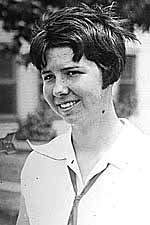 Lucile Robinson Mann‘s legacy in Iowa golf is marked by a distinguished career filled with remarkable achievements and enduring contributions to the sport. Born in Cedar Rapids, Mann’s journey to golfing greatness began at a young age, fueled by a passion for the game and an unwavering commitment to excellence. Throughout her illustrious career, she amassed an impressive collection of accolades, solidifying her status as one of Iowa’s most celebrated golfers.
Lucile Robinson Mann‘s legacy in Iowa golf is marked by a distinguished career filled with remarkable achievements and enduring contributions to the sport. Born in Cedar Rapids, Mann’s journey to golfing greatness began at a young age, fueled by a passion for the game and an unwavering commitment to excellence. Throughout her illustrious career, she amassed an impressive collection of accolades, solidifying her status as one of Iowa’s most celebrated golfers.
Mann’s list of accomplishments reads like a testament to her extraordinary talent and dedication. A dominant force on the fairways, she claimed victory in numerous prestigious tournaments, including the Iowa Women’s Amateur Championship. Her remarkable consistency and ability to perform under pressure earned her widespread recognition and respect within the golfing community.
Her remarkable stretch of Iowa Women’s Amateur titles began in 1929 when she claimed her first at Des Moines Golf & Country Club. After falling short in 1930 a fire was lit in Mann as she returned to championship form in 1931 capturing her second title in three years, this time coming at Hyperion Field Club. She was the brightest star on the state’s biggest stage from 1931 through 1934 as she reeled off a remarkable four straight titles. Three of the biggest years of her career came in 1933, 1934, and 1941.
In 1933, Mann claimed both the Iowa Women’s Amateur and the Women’s Western Amateur titles. In 1934, she captured the Iowa Women’s Amateur which for many players would be the highlight of their year. Not for Mann. Earlier in the summer, she got called up to represent her country on the U.S. Curtis Cup Team. The U.S. defeated Great Britain convincingly that year, keeping the trophy on home soil, by a score of 6 ½ to 2 ½. The Iowa Women’s Amateur wouldn’t be the only trophy of Mann’s career that she won multiple times as she reclaimed the Women’s Western Amateur in 1941.
In addition to her accomplishments on the course, Mann’s influence on Iowa golf reaches well beyond the boundaries of the fairways. As a devoted mentor and ambassador for the sport, she inspired countless aspiring golfers to pursue their dreams and reach their full potential. Her unwavering dedication to promoting the game and nurturing the next generation of talent has left a deep-rooted mark on Iowa golf, ensuring that her legacy will stand for generations to come.
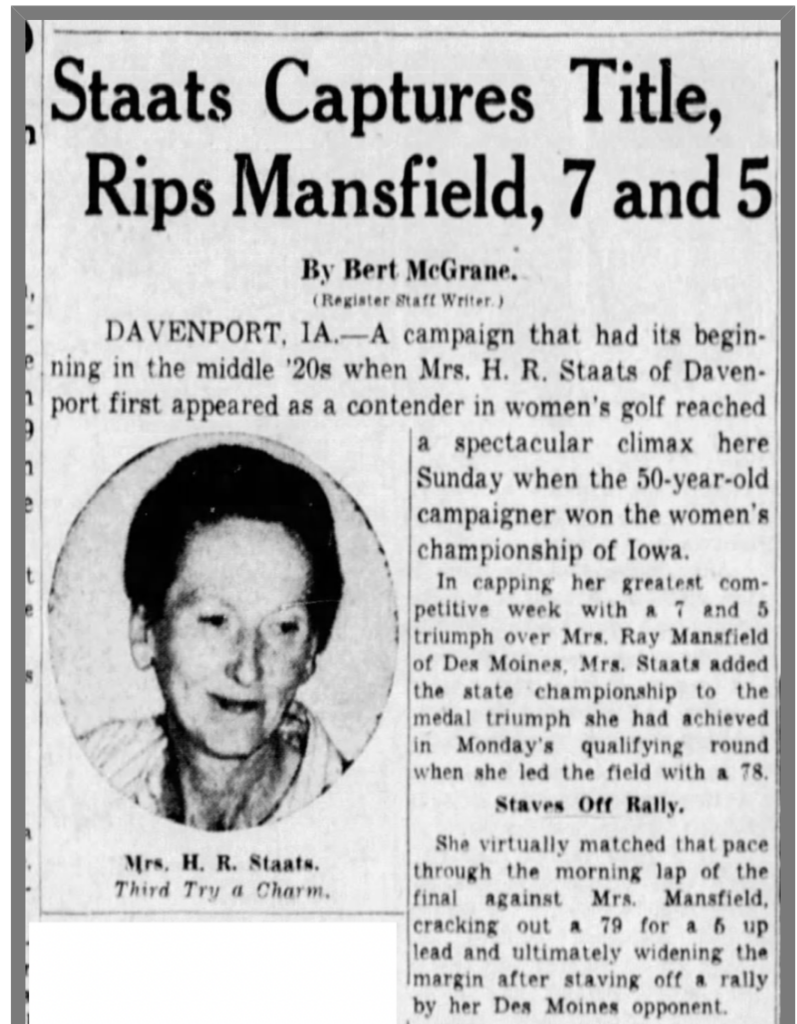 While many players have found success early on in their Iowa Women’s Amateur playing history, few have had to wait as long as Nell Staats. Staats claimed her lone Iowa Women’s Amateur title after more than two decades of teeing it up in the championship and proved that age is nothing but a number. Entering the 1949 Iowa Women’s Amateur, the Davenport native wasn’t a player many feared going up against. The 50-year-old quickly proved everyone wrong, dominating the final match 7 & 5 over Mrs. Ray Mansfield.
While many players have found success early on in their Iowa Women’s Amateur playing history, few have had to wait as long as Nell Staats. Staats claimed her lone Iowa Women’s Amateur title after more than two decades of teeing it up in the championship and proved that age is nothing but a number. Entering the 1949 Iowa Women’s Amateur, the Davenport native wasn’t a player many feared going up against. The 50-year-old quickly proved everyone wrong, dominating the final match 7 & 5 over Mrs. Ray Mansfield.
It was evident early in the championship finals that Staats had her eyes on the prize. She lost just two of the first 16 holes and led 5 up after the morning 18. The afternoon 18 slowed her momentum as her lead shrunk to just three up through 21. She steadied the ship, and thanks to a short miss from Manfield, regained the momentum on the 24th. She never looked back, increasing her lead, ultimately closing out Manfield on the 31st hole. With the victory, Staats became the oldest champion in tournament history and just the second Davenport native to claim the title following in the footsteps of Elisabeth Waterman.
 Between the years of 1960 and 1970, the Iowa Women’s Amateur was won nine times by players with the last names of Nydle and Fladoos. But in 1964, Coralville’s Royleen Tipton made waves at Ottumwa Muni Golf Course for all the right reasons. Before teeing it up, Tipton was the dark horse of the championship. Just a week prior, she became an Iowa resident and had only been golfing for four years. Consistent, and personal best, rounds of golf saw the teenager capture the title by a staggering eight shots over a plethora of household names.
Between the years of 1960 and 1970, the Iowa Women’s Amateur was won nine times by players with the last names of Nydle and Fladoos. But in 1964, Coralville’s Royleen Tipton made waves at Ottumwa Muni Golf Course for all the right reasons. Before teeing it up, Tipton was the dark horse of the championship. Just a week prior, she became an Iowa resident and had only been golfing for four years. Consistent, and personal best, rounds of golf saw the teenager capture the title by a staggering eight shots over a plethora of household names.
After earning the qualifying medalist spot with a 75, Tipton followed with rounds of 79, 76, 77 to post 307. The self-made player unleashed tee shots of up to 250 yards as spectators and fellow competitors could do nothing but watch in awe, and perhaps envy. Defending champion Corkey Nydle told reporters, “I think she surpasses any woman golfer we’ve had in Iowa for a long time”. High praise from someone like Nydle who at the time had racked up two victories at the top event. Linda Schelldorf and Jacque Fladoos finished second and third, respectively, to round out the all-teenage top three.
Linda Frisch of Cedar Rapids knew all about taking a break from golf. She had taken off three consecutive summers leading up to the 1973 Iowa Women’s Amateur when working at a summer camp. Even with the break, Frisch never lost her competitive edge and ultimately claimed a two-stroke victory over fellow Cedar Rapids resident Sue Harmon.
Frisch, who entered the final round with a three-shot lead, stumbled early and saw her lead disappear after taking a quadruple bogey eight on the second hole. She would later recount that the only mistake she made during the final round was hitting it in the rough on the second hole. The mistake, which was made twice, required penalty drops to complete the hole. The early hiccup allowed for her three closest pursuers to inch closer in hopes of claiming the title. Frisch steadied herself and returned to the form that earned her a spot in the final pairing, posting a back nine score of 37. Her maiden victory was capped off with a birdie on the 18th hole, set up by a blistering 265-yard drive.
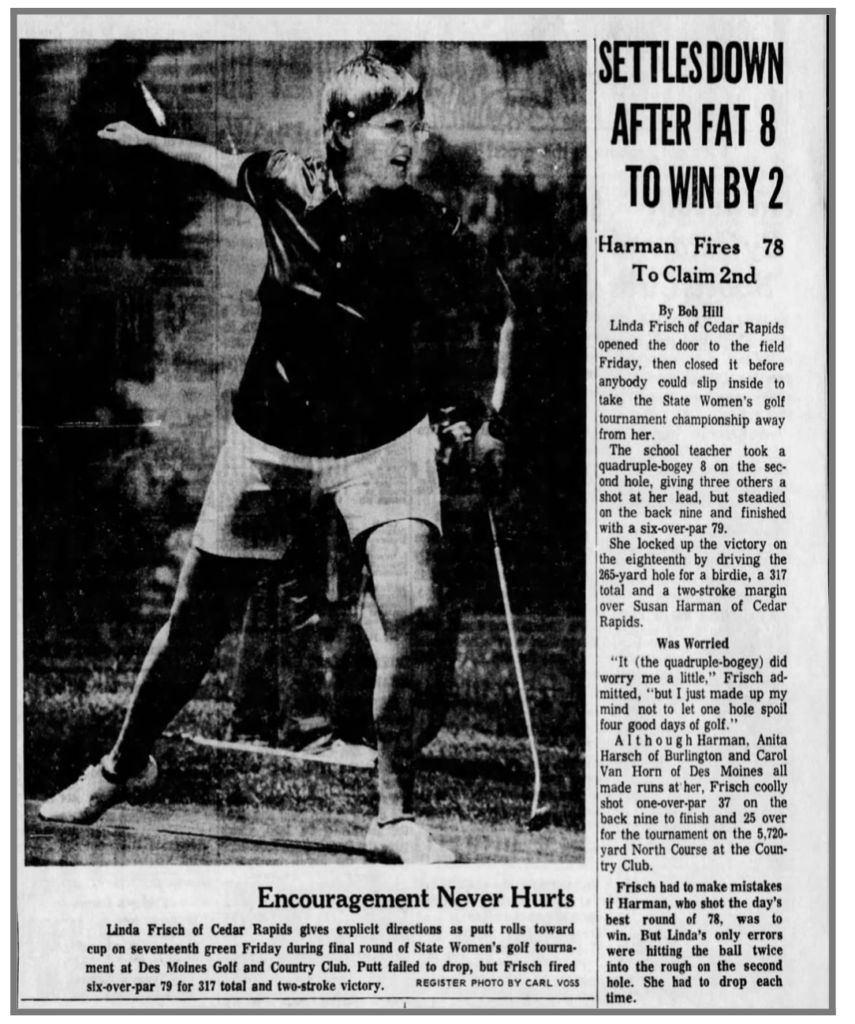
It wouldn’t be the last time she hoisted the Fladoos trophy either, as she did so again in 1977, this time coming at Beaver Hills Country Club in Cedar Falls. Once again leading by two in the final round, Frisch watched as her closest competitors stumbled. After tying the lead on the 13th, Anita Harsh hit two balls in the water on the 15th to all but dash her championship hopes. After struggling for most of the 15th hole, Beth Kirkpatrick knocked her wedge to less than two feet from the cup, managing to save bogey and stay one back of Frisch.
As the dust settled, the pair found themselves tied for the lead entering the penultimate hole after an untimely pair of bogeys from Frisch on the 15th and 16th. They would remain tied heading into the 18th and final hole after exchanging pars on the 17th. With a thirty-foot birdie putt on the final green, Frisch nestled it up to just eighteen inches. After Kirkpatrick tapped in for bogey, Frisch calmly drained the putt for her second crown in four years. The key to securing her second title? Avoiding the big numbers. “I had a lot of bogeys but no doubles or triples and those are the ones that hurt you,” Frisch would later say.
Susan Shinn was self-described anxious during the final round at the 1974 Iowa Women’s Amateur. Only, the rest of the field had no clue. As the Waterloo native strolled the fairways at Lakeshore Golf & Country Club, she looked like a woman on a mission. However, her mind was quickly skipping forward to the 18th green and making one final putt. “I guess I was just too anxious to finish” she later said.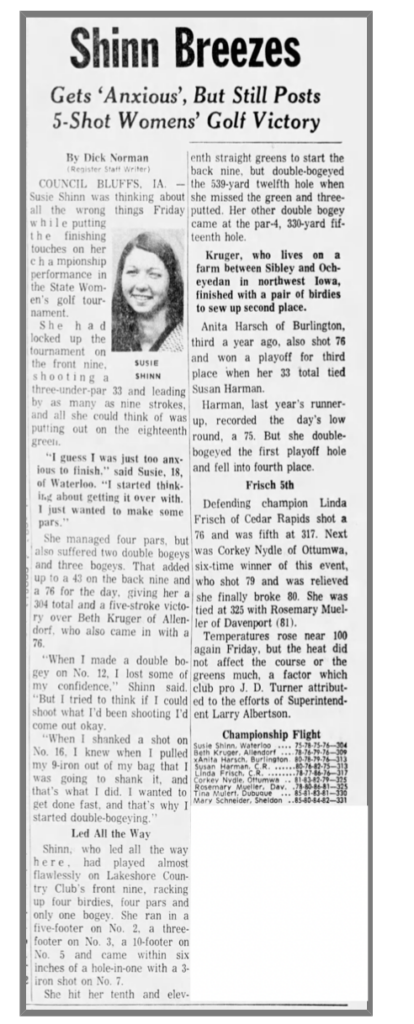
The well-masked nerves never alerted her fellow competitors as she bolted out of the gates with birdies on two, three, five, and seven. The four birdies, for a combined total of 18 and a half feet, saw her turn in an impressive 3-under-par 33. After beginning the back nine with two pars, her lead ballooned to as many as 9 as the hot July day wore on. Even with two late stumbles, Shinn held on to claim a five-stroke win over Beth Kruger.
Defending her title the following year, Shinn came up short as she finished in solo sixth. Coming back in 1976, she was determined to once again win the Iowa Women’s Amateur in what would likely be her finale. Shinn didn’t just win; she blitzed the field of veterans and fellow champions by 11 shots. Opening the championship with a course record 68, Shinn slept on an overnight six-stroke lead. The lead would stay steady through the second and third rounds, but the final round was where Shinn further separated herself from her counterparts.
Beginning with three straight pars, Shinn birdied the fourth to push her lead to double digits over Frisch. The lead was cut to seven on two separate occasions, but it wouldn’t last. Late in the day, Shinn led by as many as 12. Even with a less than hot putter, Shinn reflected that she made putts when she needed to as the championship went on. Her large margin of victory marked the second straight championship with a runaway victory.
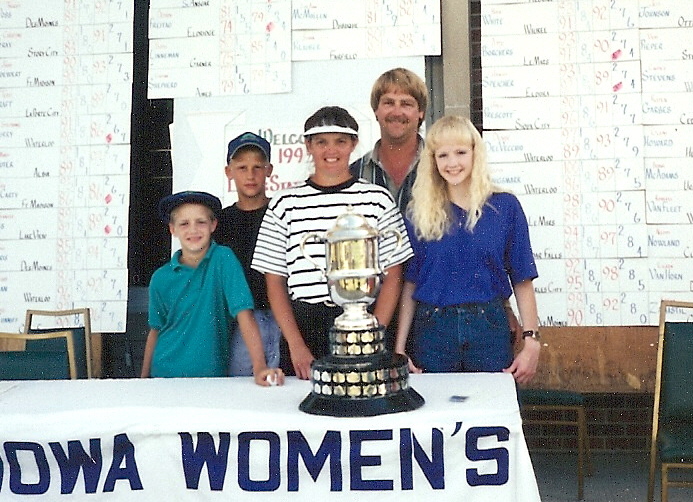 Beth Duenow’s best finish at the Iowa Women’s Amateur was a tie for sixth in 1986. She was in her late 30’s and a mother of three when she teed it up at Sunnyside Country Club in the 1995 Iowa Women’s Amateur. Playing with three collegiate players, Duenow proved that life experiences can translate to on-course success as she claimed a five-stroke victory and etched her name on the Fladoos trophy.
Beth Duenow’s best finish at the Iowa Women’s Amateur was a tie for sixth in 1986. She was in her late 30’s and a mother of three when she teed it up at Sunnyside Country Club in the 1995 Iowa Women’s Amateur. Playing with three collegiate players, Duenow proved that life experiences can translate to on-course success as she claimed a five-stroke victory and etched her name on the Fladoos trophy.
Beginning the final round, Ames’ Lisa Horton held a two-shot lead over Duenow and Iowa State’s Beth Bader. After the first hole, the three were tied. A quick bogey from Horton and two birdies from Bader and Duenow had spectators excited for the remainder of the final round. Duenow had other plans. For the remaining 17 holes, Duenow either held the lead or was tied for the lead. After holding the lead for a brief moment on the 4th hole, Duenow found herself in a three-way tie heading into the final nine.
Falling to one back after a bogey on the 11th, Duenow made a clutch up and down from the greenside bunker on the 12th to once again overtake Horton. Then, a birdie on 15 put Duenow in firm control of the championship. Closing with an even-par 36, Duenow won her first Iowa Women’s Amateur at the same site where she first began her Iowa Women’s Amateur career. Duenow reflected on the 1982 championship where she first saw the Fladoos trophy and wondered “Who would ever be good enough to win this?”. In 1995, it was Duenow, the perennial club champion at the Acorn Park course in St. Ansgar who was good enough.
Next Week on Women’s Wednesday…
In honor of National Teacher Day, learn about the dedicated coaches whose guidance shapes the next generation of golf talent.


